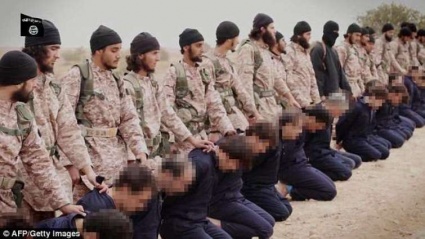January 1, 2015
Why young Canadians become jihadists?

In an effort to understand how "ordinary" young people - by most outward appearances - from Canada find themselves in Syria fighting on behalf of ISIS, Dr. Lorne Dawson, a professor in the Department of Sociology and Legal Studies at the University of Waterloo, is working with a group of researchers now in contact with some of those Canadian nationals fighting in Syria.
Dr. Dawson said that because these researchers are academics, not journalists, he feels the Canadians fighting for ISIS are more forthcoming.
“We talk to them about their lives there; why they went there. We getting to formal interviews, but we have some hints from talking to them and talking to other scholars.”
Dr. Dawson said he and the other researchers have managed to identify a number of issues that may have led these young people to terrorism.
“In early to mid-adolescence they've had a hard time figuring out who they are. They really accepted the values they were taught but then they start to think their parents and the people in their communities are hypocrites (because they don't practice these values the way they were taught). They're quite offended.”
He added that a large percentage of people who become jihadists were involved in gangstra rap. “They were playing around with extreme identities. He may not feel he's somebody.”
A desire to do something big - something virtuous – is often part of this adolescent struggle for a satisfying identity, Dr. Lawson said.
“They have a desire for action.”
Not every young person in these circumstances becomes radicalized, and not every radicalized young person becomes violent. Radicalization, he adds, usually needs what sociologists call a “cognitive opening,” a period when a vulnerable young person meets a charismatic proponent online or in person.
When a young person becomes more religious, it could be a good thing, Dr. Dawson said; but when they become very strict, start saying extreme things, avoid others and start viciously attacking others who don't have the same views, they may be headed toward radicalization.
Dr. Dawson said that although these young people are open to new ideas, it doesn't necessarily have to be radical ideas.
“They may decide to join a group and go to Guatemala to build schools.”
However, he added that there is an abundance of information online extolling young people to jihad, to lead a pure life and rise above the apathetic life.
“There's mountains of information online. Through social media they can get in direct contact with people in Syria and they can have personal contact with young people in Canada. A personal connection is crucial. People join movements because of personal connections.”
While those close to young people who have become radicalized often express shock, Dr. Lawson said quite often these young people spent months communicating with and often associating with people who are part of a group with radical views.
Islam – along with Christianity, Judaism - contains the concept of certain people being ordained, with God choosing specific souls to transform the world, and Dr. Lawson said ISIS is playing on this.
“They say the end time is here. It's a clarion call for idealist, naive young people who want to become a part of this event.”
From his contact with those who are fighting in Syria, Dr. Lawson has concluded that the message has transformed the thinking of these young people.
“They're really fully immersed in the idea of a special status of an Islamic state. They believe they're participating in a world transforming event and they will receive the blessings and bliss of martyrdom.”
This indoctrination leads to the dilemma of how to deal with these young people when they return to Canada.
To begin with, Dr. Dawson said he and his team of researchers estimate that about 50 Canadians are fighting in Syria – more than the Canadian government estimates. He said imprisoning returnees doesn't serve a purpose because then people will come back covertly, lead a secret life, be marginalized and, thus more likely to lash out again. Prosecuting them doesn't seem like a realistic option to Dr. Dawson because it would be expensive and very difficult to prove that these people were involved in terrorism overseas.
“What are you going to do? Put 30 or 40 guys under surveillance for 24 hours a day, and for how long?”
He said Denmark has a council of psychotherapists assisting returnees in going back to school or finding a job and, “so far so good.”
He also mentioned that Australia has a law, which forbids any Australian from fighting for a foreign force, and those who do are jailed as soon as they come home. But one wonders what havoc these prisoners will potentially wreak on society, when they are eventually released, assuming they don't receive sentences of life without parole.








